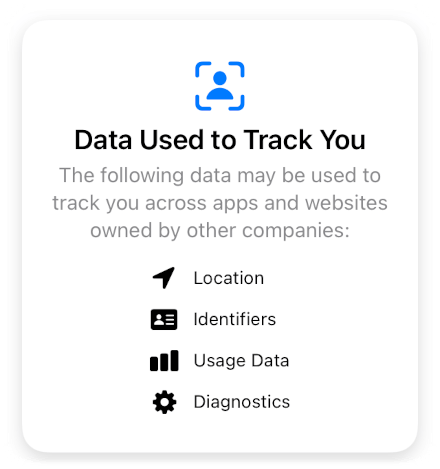Does Apple care about user privacy?
A short analysis of the latest AppStore changes
- Apple will force app developers to ask explicit consent to their users for the usage of their personal data to track them.
- It is expected that apps that rely on ads observe a drop in their revenue.
- Apple creates the Small Business Program in which small developers can benefit from a reduction fee of their purchases in the AppStore from 30% to 15%.
- Why is Apple doing all of these moves recently?
Starting from iOS 14.5 app developers will be forced to ask explicit permission through the new AppTrackingTransparency framework in order to enable targeted tracking. This new system ensures that only approved app-makers will be able to use targeted advertising and identifying users within an app. It is expected that the vast majority of iOS users will not give their consent to be tracked by the app manufacturers.
Additionally, we've seen in the previous month the inclusion of the so-called "privacy nutrition labels" into the AppStore; a set of labels such as Location or Contact Info that developers must include in the store listing. They must also explicitly state the kind of usage of that information, whether is data used to track you, data linked to you, data not linked to you, etc.

User privacy
At first glance, these initiatives seem like a step in the right direction, a way to protect consumers from the data mining that most of us suffer from big tech in many websites, apps or online services.
By denying this kind of tracking, the app won't be able to use the device IDFA, a unique identifier that ads and tracking companies utilize in order to uniquely identifying users. If the user allows access to this identifier, all the activity within the app can be linked to other activities gathered in order websites, apps, or services; even if the user does not provide explicitly any personal information or sign in with their user account.
Seems too good to be true, why Apple is doing such a move right now?
What will happen with apps that rely on advertising
Nowadays a lot of apps depend on advertising to monetize the project. With the option to disallow the use of tracking data to provide targeted advertising, the revenue of all of these apps might decrease. How much will it decrease? Depending on the type of app, and the use of their ads, the revenue can drop in many different ways. Some people think that targeted advertisement has a drastic effect on the performance of marketing campaigns, while other people believe that the effect is slightly better than the non-targeted advertisement. In one way or another, it is expected that the revenue of the app will decrease.
Then, what can do the app makers to recover from the revenue loss? One valid option is to implement in-app purchases and subscriptions. This way the creator of the app can have a source of income that does not depend on ads nor tracking. The user then pays for a single purchase or pays periodically for a subscription, then in return gets some benefits, like premium access to the app features.
In fact, a lot of apps combine the two methods: they show ads to non-purchasers (or non-subscribers) and then try to engage the user until they make a purchase or subscribe to the app; and then among other benefits, the ads are gone.
The 30% cut of the AppStore
One important point to mention when we talk about in-app purchases or in-app subscriptions is the business model behind it. Here Apple acts as a platform provider, they put the store and the payment processing flow. As a developer, you can easily implement this kind of purchases without worrying too much about processing payments or handling taxes. The counterpart: Apple takes 30% of all of your sales as their commission.
Another important move Apple has made for this year is the creation of the Small Business Program, in which small teams can benefit from a reduction of the commission from 30% to 15%. This seems a move towards making the inclusion of purchases within iOS apps a more appealing process for app developers.
So... does Apple care about user privacy?
Now let's create an equation with all of the recent moves that the Cupertino company has done in the previous months:
- Implement a transparency framework so users can easily disable targeting techniques within the app such as targeting advertisement or user tracking, this will lead to a decrease of revenue for app makers that depend on ads.
- Force app makers to state what kind of sensitive data the app is using in the store listing, leading maybe a decrease of use and thus a decrease of revenue for apps that do targeting advertisement.
- Reduce the 30% cut for in-app purchases and subscriptions to 15%, making it easier and appealing for app developers to implement it.
What's the result of all that? First of all, it seems like a well-planned and very curated business strategy. On one hand, they can make their users happy by protecting their privacy, and on the other hand, they will probably increase the number of purchases within iOS apps and thus increase their revenue in the long term.
Being a well intentioned move or a strategic approach on how to make more money, the denying fact is that this will indeed enhance the privacy of the end users, and this is at the end of the day what matters.
